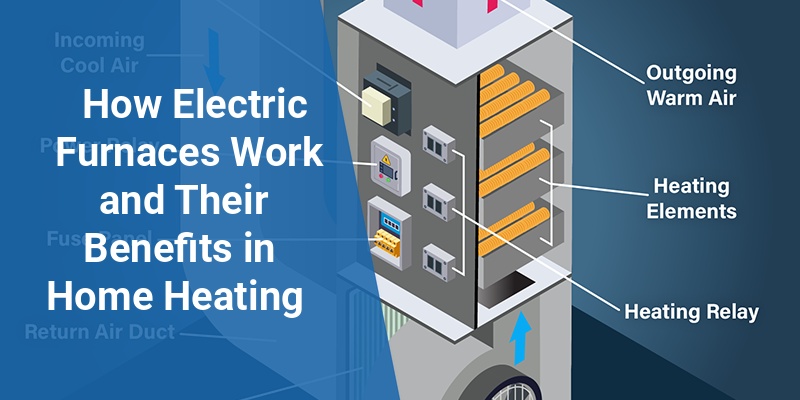An electric furnace is a popular heating option for many American households seeking efficient and clean ways to warm their homes. Unlike traditional gas or oil furnaces, electric furnaces use electricity to generate heat, offering unique advantages in terms of safety, maintenance, and environmental impact. This comprehensive article dives into the workings, benefits, cost considerations, and installation insights of electric furnaces, helping homeowners make informed decisions for their heating needs.
| Aspect | Electric Furnace Advantage |
|---|---|
| Heating Method | Uses electric resistance coils to produce heat |
| Installation | Easier and often lower upfront cost compared to gas systems |
| Maintenance | Low maintenance with no combustion byproducts |
| Environmental Impact | Zero onsite emissions; depends on electricity source |
| Operating Costs | Generally higher electricity bills, depending on local rates |
How Does An Electric Furnace Work?
An electric furnace heats homes by passing electric current through heating elements usually made from metal coils. As electricity flows through these coils, they convert electrical energy into heat through a process called electric resistance. A fan circulates air across the hot coils, distributing warm air through ductwork into living spaces.
This type of furnace does not rely on combustion, which means it produces no fumes like carbon monoxide or other emissions that come from burning fossil fuels. The heating elements operate at various power levels controlled by a thermostat to maintain a consistent, comfortable temperature inside the home.
Benefits Of Using An Electric Furnace
Electric furnaces offer several advantages over conventional heating systems:
- Safety: Without combustion, electric furnaces eliminate risks associated with gas leaks or carbon monoxide poisoning.
- Lower Maintenance: They require less upkeep since there are no burners, flues, or exhaust pipes to clean or inspect.
- Clean Operation: Electric furnaces produce no onsite air pollutants, supporting better indoor air quality.
- Installation Flexibility: Can be installed in locations where gas supply isn’t available or in homes aiming to transition to renewable energy sources.
- Quiet Operation: Electric heating elements generate less noise compared to gas furnace blowers and burners.
Cost And Energy Efficiency Considerations
Electric furnaces typically cost less upfront than gas furnace models, making them attractive for budget-conscious installations.
However, electricity prices are generally higher than natural gas rates in many regions, resulting in higher operating costs for electric heating systems. The overall cost-effectiveness depends heavily on local electricity tariffs and energy efficiency strategies in the home.
Electric furnaces are almost 100% efficient at converting electrical energy into heat because every watt of electricity is converted into heat without combustion loss. Still, this high efficiency does not always translate into lower utility bills compared to lower-cost fuel sources.
Call 888-906-9139 for Free Local HVAC Quotes – No Obligation, Just Savings!
Electric Furnaces And Environmental Impact
The environmental footprint of an electric furnace depends principally on the electricity generation mix. In regions where electricity is generated predominantly from renewable sources like wind, solar, or hydropower, electric heating significantly reduces greenhouse gas emissions.
Conversely, in areas relying heavily on coal or natural gas for power generation, the indirect carbon footprint may offset the benefits of zero onsite emissions.
Transitioning to cleaner energy grids enhances the sustainability of electric heating systems.
Installation And Maintenance Of Electric Furnaces
Electric furnace installation is generally straightforward since it does not require venting or fuel lines. Typical installations involve setting up the furnace in a utility area and connecting it to the existing ductwork and electric panel.
Because electric furnaces have fewer mechanical parts than gas furnaces, maintenance mainly consists of checking the electrical connections, replacing air filters regularly, and ensuring the blower and controls function properly.
This simplicity helps lower ongoing maintenance costs and reduces the likelihood of system failures.
Electric Furnaces Versus Heat Pumps: Choosing The Right System
Heat pumps offer an alternative electric heating method by moving heat rather than generating it. They tend to be more energy-efficient in moderate climates because they consume less electricity when extracting heat from the outside air.
Call 888-906-9139 for Free Local HVAC Quotes – No Obligation, Just Savings!
Electric furnaces, however, provide reliable heating in extremely cold conditions where heat pumps may lose efficiency.
Homeowners should evaluate their climate, energy costs, and heating demands before selecting between these systems.
Popular Brands And Models Of Electric Furnaces
The market offers a range of electric furnace brands designed for residential use, including Carrier, Lennox, Trane, and Goodman. These manufacturers provide models varying in capacity, efficiency ratings, and features such as variable speed blowers or advanced thermostats.
When selecting an electric furnace, consider factors such as size, compatibility with existing ductwork, and energy efficiency certifications like ENERGY STAR.
Energy Saving Tips For Homes With Electric Furnaces
- Optimize thermostat settings to avoid excessive heating when not needed.
- Use programmable or smart thermostats to schedule heating cycles efficiently.
- Improve home insulation to retain heat and reduce demand on the furnace.
- Regularly maintain the furnace and clean air filters to maximize airflow and system performance.
- Seal leaks in windows and doors to prevent heat loss.
Electric Furnace Rebates And Incentives
Many utility companies and government programs offer rebates or tax credits for installing energy-efficient electric furnaces or upgrading home heating systems.
Homeowners should check local incentive programs which can offset installation costs and improve the return on investment for electric heating.
Taking advantage of these offers can make electric furnaces a more affordable option.
Call 888-906-9139 for Free Local HVAC Quotes – No Obligation, Just Savings!
